- Home
- William Ritter
Changeling Page 2
Changeling Read online
Page 2
“The woman was already quite old back then,” said the pastor gently. “I’m sure she’s long passed by now, God rest her. That hasn’t stopped the stories about that poor lady from growing into absolute nonsense.”
“It’s not nonsense,” mumbled Old Jim.
For once, Mrs. Grouse seemed to agree with him. “Indeed it’s not. Proof enough is in that bassinet,” she insisted. “It isn’t natural. Isn’t right. It’s goblins, I swear. It’s a changeling.”
Nobody wanted to agree with the superstitious woman, but nobody could truly say she was wrong, either. You couldn’t live your life beside the Wild Wood and not believe at least a few of the old stories.
They burned sage and poked both children with silver, but the babies only sneezed and giggled and batted at the spoons. Nobody in town was quite certain what to look for in a changeling. Eventually, somebody got the idea to send away for advice from an expert they had heard about out in New Fiddleham. Iron—the expert advised them by post—touch the child with iron within the first three days. By the time this counsel arrived, seven days had passed. They tried anyway, but both babies just grappled at the fireplace poker and got soot all over their swaddling clothes.
And so, after a week of dithering and debating, it was decided (for lack of a better option) that they would simply have to wait. The goblin child would reveal its own true nature eventually. A goblin, after all, couldn’t resist getting up to all manner of mischief. They would just have to be wary and watchful. Until then, the Burtons would care for both boys as their own.
Bit by bit, the neighbors ceased stopping by to gawk and speculate until, one evening, only Mrs. Grouse remained. “A goblin, Annie,” she reminded her, unnecessarily, before she left for the night. “A horrible goblin changeling, sleeping side by side with your own flesh and blood.”
“Good night, Helen.”
The boys were indeed sleeping side by side as Annie closed the door behind her. Annie could not help but notice that her own baby—whichever one it was—had slept more soundly since the arrival of his mysterious twin. They seemed equally calmed by each other’s presence and distressed by their separation. They would cry ceaselessly when she attempted to move them into different rooms, but quieted at once when they were back in each other’s company, until soon they would be snoring peacefully. She watched them for a long time, listening to the soft rhythm of their breathing.
Until the changeling’s natural mischief gave the wicked thing away, she would let the matter rest, along with the boys. Her boys.
No reason to rush the matter, Annie thought, taking a deep breath. After all, they would know the truth soon enough.
THREE
It had been twelve years, eleven months, and twenty-eight days since Annie Burton’s baby had mysteriously become two babies. By now she had learned what more experienced parents could have told her as a young mother: mischief is in the nature of goblins and growing children in roughly equal measure, which left the matter uncertain far longer than she had anticipated.
Annie Burton was not the sort of woman to be thwarted by a little twist of fate. Fate, it seemed, had taken this as a challenge. It had been twelve years, eleven months, and twenty-one days since Annie Burton had become a widow.
Some of the gossips in town considered her less a widow and more an abandoned wife—Joseph Burton had clearly left work alive that night and simply never arrived back home—but Annie refused to believe her husband would leave her alone with two crying, kicking, grappling, growing baby boys for anything less than his own demise. Annie knew she was a widow. The way that she said it, with her jaw set and her eyes tense and narrow, made the townspeople hope, for her husband’s sake, that she was right.
Annie wiped the sweat from her brow and pulled with both hands. The long, stubborn blackberry vine in her grip finally ripped free, its roots giving up their hold. Annie took a deep, satisfied breath and tugged, unwinding the pernicious thing from the slats in her back fence. When she and Joseph had moved into the little cottage, the plant had been growing right up to their back door. Inch by inch, year by year, she had cut the vines back. As the boys had grown older, they had begun to help her, chopping at the brambles like knights battling a thorny dragon, and together they kept the vines at bay. Annie now stood in the wide garden that they had grown where the persistent plant had once held dominion. The plot of land had been hard won, and she was not about to let the prickly brute reclaim it.
She tossed the vanquished vine on the heap with the others. Its thin, wispy end whipped toward her as she threw it, catching her a scratch across the neck with its tiny barbs. She gritted her teeth and glowered at the fallen plant. “Was that really necessary?” she said.
As if in reply, voices carried across the grass from the front of the house. Annie recognized their cadence long before they were close enough for her to make out their words. Dusting her hands off on her apron, she gave the garden one last look before her boys came tumbling through it, then braced herself for the inevitable fistfuls of tadpoles, chronicles of skinned knees (they always came in twos with her boys), or, worse: the flood of excuses about whichever neighbor was likely to come around soon with wild accusations about something that was definitely, absolutely, positively not the twins’ fault.
“—gotta go back, then,” one of the boys was saying as they neared.
“That is a idea,” the other replied.
“What’s a terrible idea?” Annie asked as her boys came around the corner.
“Hi, Mom!” Cole said, a little more loudly than was strictly necessary.
“The garden looks really good, Mom,” Tinn added. “You want some help?”
“I want to know what’s a terrible idea.”
The twins glanced at each other.
“Yams,” said Cole.
“Catapult,” said Tinn at the same time.
“Yam catapult,” said Cole. “Terrible idea.”
Tinn nodded. “Waste of good vegetables.”
Annie sighed. “And that is exactly the reason I kicked the two of you out of the garden this morning. What have you been up to?”
“Just playing in our climbing tree out by the creek,” said Cole.
Annie glanced at Tinn, one eyebrow raised.
“Yep. Out by the creek. We were about to go back. I . . .” Tinn’s eyes flickered to Cole and back. “I forgot my hat.”
“You swear to me you haven’t been anywhere near the mill this time?” Annie pressed. “Or down into the quarry?”
“No, ma’am,” the boys said together.
Annie looked suspiciously from Tinn to Cole. “You promise to behave yourselves?”
As one, the boys grinned and nodded.
Annie Burton sighed the heavy sigh of a mother who knows her children far too well and somehow loves them anyway. “I expect you back before sundown,” she said, though she said the final word to the boys’ backs as they scampered away.
“Love you, Mom!” they called over their shoulders in unison.
“Don’t you dare go into Old Jim’s orchard, either!” Annie yelled after them. “I don’t want to hear one word about you two trespassing again! You know how that man gets.”
“We would never!” Cole called back earnestly, dashing around the corner of the house.
“We know the rules!” yelled Tinn, one step behind his brother.
Ten minutes later, the boys rounded the bend to Old Jim’s orchard. The path was lined with old, twisty, knobby trees.
“This really is a terrible idea,” whispered Tinn.
“Yup. Shoulda thought of that before you went and left your hat in a stupid apple tree,” Cole replied.
“It’s not like I did it on purpose!” Tinn groused. “Old Jim almost caught me. I barely got down in time. Skinned my shin real bad on the way.”
“Tree got yours? Mine got all tore up on the fence.”
They paused to pull up their pant legs and compare wounds. For as long as they could remember, the twins
had not only looked the same, they had always managed to sustain identical injuries. When one cut his finger on a nail, the other would invariably have a run-in with the cat’s claws or a broken glass.
Tinn grumbled as he pulled his cuff back down. “This is your fault.”
“Yeah, well. It’s your hat,” said Cole. “If we don't sneak back in and get it, then Old Jim’s gonna find it, and you just know he’ll tell Mom. If you don’t wanna get in trouble for sneaking in again, then we gotta sneak back in again.”
“You’re such a dummy.”
“Yeah, well—I’m the dummy with a hat.”
“You could at least pretend you’re not enjoying this.”
Cole just grinned and walked a little faster.
They rounded the last turn and jolted to a stop. Ahead of them, not a hundred feet away, Old Jim himself was bent over a fallen piece of his weathered fence. The twins ducked behind the nearest tree to hide.
“I’ve got an idea,” whispered Cole.
“No,” said Tinn.
“Aw, come on. He hasn’t seen us yet,” said Cole.
“No,” said Tinn.
“Let’s do it just like last Thanksgiving,” said Cole, his eyes bright. He peered around the tree trunk.
“We got grounded for a week for last Thanksgiving,” hissed Tinn. “And I still have cranberry stains on my shoes.”
“Fine. Not exactly like last Thanksgiving. He’s not looking—here we go!” Cole darted across the path, taking cover behind another tree, twenty feet closer to Jim’s orchard.
Tinn swallowed nervously. He peered around the tree trunk and down the path. Old Jim was still facing away, rummaging about in a battered wooden toolbox. Tinn felt the familiar twisting in his stomach. He glanced over at Cole. He could almost feel the energy rippling off his brother. Cole kept his head low—if he had been a cat, his tail would have been twitching. He gave Tinn an enthusiastic thumbs-up, and Tinn tried very hard not to smile. Smiling only encouraged his brother. Cole was doing this, and if Cole was doing it, then Tinn was doing it.
As quietly as he could, Tinn stepped out from behind the tree.
Old Jim turned around.
“Who’s that?” the farmer called, straightening.
“Just me,” said Tinn, trying to walk as nonchalantly as he could. He stumbled, and then laughed nervously. His palms already felt sweaty. What did he normally do with his hands when he was walking? He was pretty sure he wasn’t doing it now.
“Me who?” the old man barked.
Out of the corner of his eye, Tinn saw Cole grinning up at him before he disappeared behind a bush. “It’s Tinn, sir. Burton. Annie Burton’s boy. Just out walking. Um. How are you, today, sir?”
Old Jim’s eyes narrowed. “Where’s that brother of yours?”
“He’s . . . at home,” Tinn lied.
“Hmph. The two of you are thick as thieves.” Old Jim’s eyes scanned the path. Tinn was certain his gaze lingered as it passed over the bush where Cole was concealed.
“He got scared,” Tinn blurted. “He got scared and ran home.”
Jim’s bushy gray eyebrows rose and he turned back to Tinn. “That so? Scared of what?”
“Of . . . of something we saw while we were playing near the Wild Wood earlier,” Tinn bluffed. He knew at once that he had chosen the right approach. The farmer’s jaw set and his head rose. Nobody in town had more stories about the things that lurked in the Wild Wood than Old Jim.
“That so? What’d y’all see?”
Tinn stepped closer, keeping Old Jim’s eyes on him and away from Cole. “Oh, um, I’m not sure, sir. Something . . . tall?” His voice caught in his throat for a moment as Cole tiptoed across the grass, not ten feet behind Old Jim.
“Tall?”
“Tall. Yes, sir. Tall. With, um, eyes. Cole got real scared of it. He’s kind of a scaredy-cat about stuff like that. Big coward. Kind of a baby.”
From behind Old Jim, Cole stuck out his tongue at Tinn and then silently vaulted the fence. Tinn tried not to let his eyes follow Cole as his brother slipped behind the nearest tree in the orchard.
“And you ain’t scared?” the old man said.
“Huh?” said Tinn. “No. I mean, I’m not scared. I’m sure it was nothing, really. I ain’t afraid of the woods.”
“You should be.” Old Jim’s eyes bore into Tinn until he began to feel uncomfortable. “You ever gone into those woods?”
“Sure,” said Tinn, smiling nervously. “Loads of times. Mom lets us pick sassafras near the old bridge.”
“I’m not talking about the tree line, kid. I mean the woods proper. There are creatures that live in those woods that you won’t learn about in your schoolbooks. You ever been as far in as the Oddmire?”
Tinn shook his head. Over Jim’s shoulder he could see Cole shinnying up the apple tree. He gulped and shook his head. “The Oddmire. That—that’s the swampy part, right?” Keep him talking. Keep him distracted.
“The Oddmire ain’t no ordinary swamp, kid,” Old Jim said. “It will grab hold of you, turn you around, pull you down. That’s not all. The mire divides the Wild Wood in two. There’s plenty to be nervous about on this side, but the deeper you go, the worse it gets. If you manage to make it beyond the Oddmire, the woods only get thicker. The trees grow closer. The woodsmen who used to haul lumber through these parts named it the Deep Dark. Even if they could find their way past the mire, loggers knew better than to take a tree from the Deep Dark. Cursed wood. That forest changes a person. A fellow don’t come out of the Deep Dark the same man who went in.” Again, the old man’s eyes bore into Tinn.
“Have you ever been to the Deep Dark, sir?” Tinn’s voice came out like a whisper.
Old Jim’s icy gaze rose and his lips turned up in a sneer. “At the very heart of the Wild Wood, past the Oddmire, in the thickest part of the Deep Dark, they say there’s a nest of thorny vines so dense and sharp they catch anything fool enough to stumble into their grip. Not even light escapes from the bramble.”
Tinn barely noticed that Cole had climbed out onto the limb of the apple tree behind Jim. Tinn’s forgotten hat was hanging inches away from Cole’s fingertips.
“So,” Old Jim concluded, slapping his tool chest closed, “next time your brother decides he’s scared of whatever’s watching from those woods and he goes running home, you’d be wise to join him.”
Tinn’s eyes shot from the old man to Cole, who was suddenly dangling from the branch in plain sight with the hat clutched in one fist. He grinned triumphantly and waggled the hat at Tinn until he almost lost his grip, swinging wildly for a moment before catching hold of the branch again with both hands.
Old Jim sniffed and spat, then began to turn back toward the orchard. Cole froze, trapped where he hung.
“Wait!” Tinn said.
Old Jim paused and raised a bushy eyebrow.
“What, um, what do think it was?” Tinn asked. “What do you think might have been watching us from the woods?”
“Hm.” Jim nodded sagely. “All kinds of ghouls and oddlings in those woods. People used to say that the founders brought the spirits of the old country with them when they moved to Endsborough.”
“Spirits of the old country doesn’t sound so bad.”
“There’s a reason the founders left the old country, kid. Still, if there’s one thing you best hope is watching you from the Wild Wood, it’s the queen.”
Tinn shuddered. He hated these stories. The Queen of the Deep Dark. Mother of Monsters. The Witch of the Wild Wood.
“Some say she eats errant children,” Jim continued. “Others say she turns them into wild animals. Some say that she can transform at will into a wild animal herself, her cloak becoming the hide of a great beast. Some people say she planted the bramble, years ago—or else the vines are her terrible fingers, reaching out to snatch boys and girls who tread too far into her forest.”
A tree branch cracked like a rifle shot and Tinn jumped. His heart was pounding. He had lost t
rack of Cole, and now he couldn’t see him anywhere.
Old Jim spun around, scowling, and plodded into the orchard. Tinn’s mouth opened and closed, but he could think of nothing more to say to stall the farmer. Step by agonizing step, Old Jim stalked up to the tree. And then around it. And back. “Damn deer,” he cussed. “They knocked down my fence just this morning. Looks like they’ve been helping themselves to my apples again.”
Tinn let out his breath.
“Hi!” called a voice from behind him.
For the second time, Tinn jumped. Cole laughed as he came jogging up the path.
“Cole, I—you . . .”
“I just got back.” Cole winked. “From home.”
“Right. Yes! Because you were at home.”
“I brought your hat, dummy. We really should get going.”
“Right. Yeah. Well, have a good day, sir. Sorry about the . . . the deer.”
Old Jim grumbled and shook his head as he watched the boys jog away.
FOUR
“You almost got caught,” said Tinn, punching his brother in the arm. “We almost got caught!”
Cole chuckled. “It’s not fun unless you almost get caught.”
“No, it’s way more fun without getting caught. And way less scary. Old Jim gives me the heebie-jeebies.” Tinn couldn’t help but keep glancing out at the tree line as they walked along the forest’s edge. “How come you always gotta push your luck, anyway?”
“I dunno.” Cole kicked a dirt clod. “It just feels good to prove you can, I guess. Like you’re special. Don’t you ever feel like you’ve got something hiding inside you that you just wanna . . .” Cole trailed off. “You know.” They walked on in silence for several paces.
Tinn knew. Everybody knew. They knew, but they didn’t know. The boys had grown up surrounded by stories about fair folk and oddlings—and the story that the boys knew most intimately was the story of them, the story of what was hiding inside one of them. Sometimes Tinn could swear he felt it prickling just under his skin. Sometimes Cole was sure it was humming in his bones. They both wondered if they were the one. They both worried.

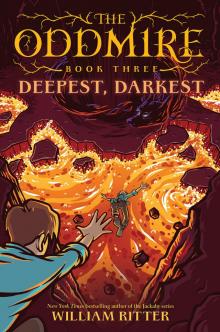 Deepest, Darkest
Deepest, Darkest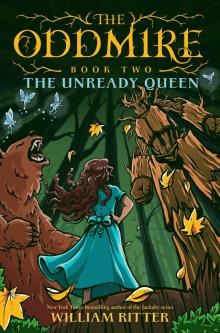 The Unready Queen
The Unready Queen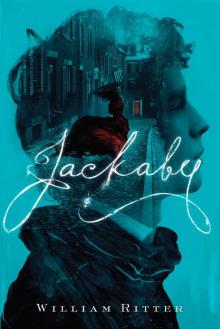 Jackaby
Jackaby Changeling
Changeling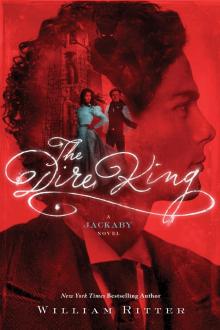 The Dire King
The Dire King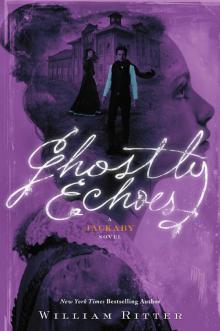 Ghostly Echoes
Ghostly Echoes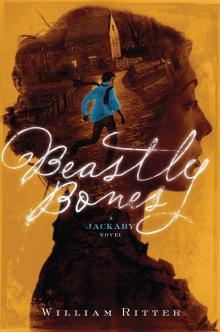 Beastly Bones
Beastly Bones